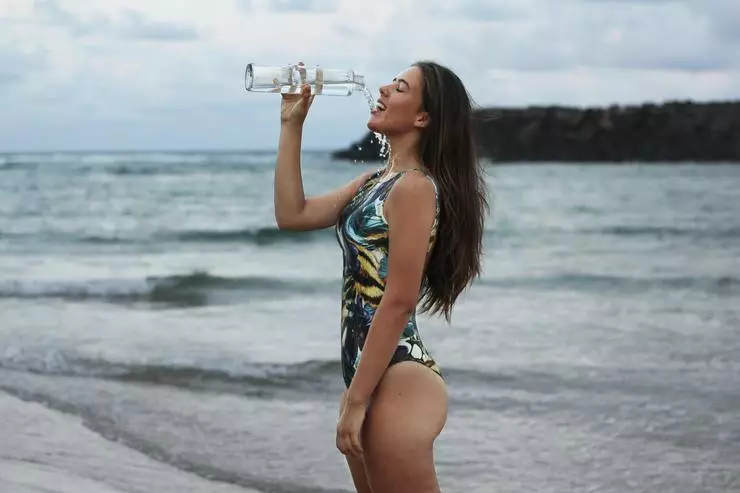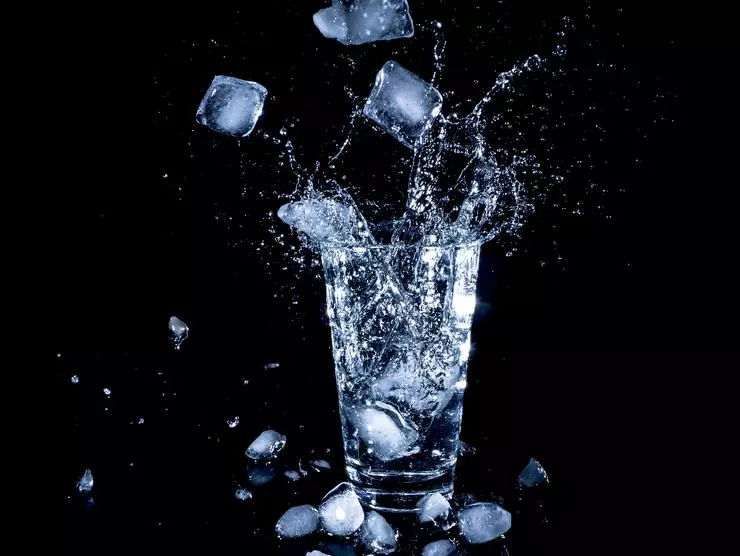During the day, the body constantly loses water, mainly with urine and then, but also due to the usual features of the body, such as breathing. To prevent dehydration, you need to drink plenty of water every day. There are many different opinions about how much water needs to drink every day. Health experts usually recommend eight glasses of 250 ml, which corresponds to about 2 liters per day.
However, some experts believe that you need to constantly drink water throughout the day, even if you do not want to drink. This article discusses some studies of water consumption to separate the facts from fiction, and is explained how to easily maintain a high level of hydration according to your individual needs.
How much water do you need?
It depends on many things and varies from person to man. For adults, the general recommendation of the National Academy of Sciences, USA Engineering and Medicine: 11.5 cups (2.7 liters) per day for women, 15.5 glasses (3.7 liters) per day for men. This includes fluids from water, beverages such as tea and juice, as well as food. You get an average of 20 percent of water from products that eat. Perhaps you will need more water than someone else. The amount of water also depends on these factors:
Where do you live. In hot, wet or dry places you will need more water. You will also need more water if you live in the mountains or at high altitude.
Your diet. If you drink a lot of coffee and other coffee beverages, you can lose more water due to additional urination. Most likely, you will also need to drink more water, if in your diet a lot of salted, sharp or sweet food. Or more water is necessary if you do not eat a lot of hydrating products with a high water content, such as fresh or cooked fruits and vegetables.

If you spend more time outdoors in the sun, in hot weather or in heated room, you can faster feel thirst
Photo: unsplash.com.
Temperature or season. In the warmest months you may need more water than in the cooler due to sweating.
Your environment. If you spend more outdoor time in the sun, in hot weather or in heated room, you can faster feel thirst.
How active you are. If you are active during the day, go a lot or stand, you will need more water than someone who sits at the table. If you are engaged in sports or do any intensive activity, you will need to drink more to cover the loss of water.
To your health. If you have an infection or heat, or if you lose fluid due to vomiting or diarrhea, you will need to drink more water. If you have such a disease, like diabetes, you will also need more water. Some medicines, such as diuretics, can also cause water loss.
Pregnant or nursing breasts. If you are pregnant or feed the baby breasts, you will need to drink more water to avoid dehydration. In the end, your body performs work for two (or more).
Does water consumption affect the energy level and brain?
Many people claim that if you do not drink during the day, your energy level and brain work will begin to deteriorate. In support of this there are many studies. One study involving women showed that the loss of liquid by 1.36 percent after exercises worsens the mood and concentration and increases the frequency of headaches. Another study conducted in China with the participation of 12 men at the university showed that the lack of drinking water for 36 hours has a noticeable effect on fatigue, attention and concentration, reaction rate and short-term memory.
Even light dehydration can reduce physical performance. A clinical study of elderly healthy men showed that the loss of water in the body only 1% reduces their muscle strength, power and endurance. Loss of 1% of the body weight may seem not so big, but it means that you need to lose a significant amount of water. Usually it happens when you sweat or in a very warm room and do not drink enough water.
Does you lose weight in the use of a large amount of water?
There are many statements that the use of more water can reduce body weight due to an increase in metabolism and decline in appetite. According to the study, the use of more water than usual, correlates with a decrease in body weight and body composition indicators. Another research review showed that chronic dehydration is associated with obesity, diabetes, cancer and cardiovascular diseases. Researchers in another earlier study were calculated that the use of 2 liters per day increases energy consumption of about 23 calories per day due to a thermogenic reaction or faster metabolism. Drinking water is about half an hour before meals can also reduce the number of calorie you consume. This may occur due to the fact that the body is easy to take thirst for hunger. One study showed that people who drink 500 ml of water before each food intake, lost 44% more weight in 12 weeks compared to those who did not do this. In general, it seems that the use of sufficient water, especially before meal, can improve the management of appetite and maintain healthy body weight, especially in combination with healthy diet. Moreover, the use of a large amount of water has a number of other health benefits.

Even light dehydration can reduce physical performance.
Photo: unsplash.com.
Does more water help to prevent health problems?
For the normal functioning of your body, it is necessary to drink enough water. Some health problems can also help increase water consumption:
Constipation. An increase in water consumption can help with constipation, a very common problem.
Urban channel infection. Recent studies have shown that an increase in water consumption can help prevent reuse of urinary tract and bladder infections.
Stones in the kidneys. An earlier study showed that consumption of a large amount of fluid reduces the risk of risk of stones in the kidneys, although additional research is needed.
Moisturizing the skin. Studies show that more water leads to better skin moisturizing, although additional research is needed to improve transparency and impact acne.
Are other liquids in your total number taken into account?
Ordinary water is not the only drink that helps maintain the balance of the fluid. Other drinks and products may have a significant impact. One of myths is that drinks with caffeine, such as coffee or tea, do not help hydration, because caffeine is a diuretic. In fact, studies show that the diuretic effect of these drinks is weak, but some people can cause additional urination. However, even coffee beverages helps to fill the body with water as a whole. Most products contain water in different quantities. Meat, fish, eggs and especially fruits and vegetables contain water. Together, coffee or tea and water rich can help support liquid balance.
Maintaining the water balance is necessary for your survival. For this reason, there is a complex system in your body that allows you to control when and how much you drink. When the total water content falls below a certain level, thirst arises. It is carefully balanced by mechanisms like breathing - you do not need to think about it consciously.
Your body knows how to balance the water level and when to file a signal to drink more. Although thirst can be a reliable indicator of dehydration, relying on the feeling of thirst may not be enough for optimal health or exercise. By the time of the appearance of thirst, you may already feel the consequences of insufficient hydration, such as fatigue or headaches. Using urine color as a landmark may be more useful to find out if you drink enough.
Try to get a pale transparent urine. In fact, for the rule of 8 × 8 there is no science. Nevertheless, certain circumstances may require an increase in water consumption. The most important of them may be during an increased sweating. This includes exercises and hot weather, especially in a arid climate. If you sweat a lot, be sure to reopulate the loss of liquid with water. Atlitis performing long and intensive exercises may also require replenishment of electrolytes, such as sodium and other minerals, along with water.
Your need for water increases during pregnancy and breastfeeding. You also need more water when you have heat, vomiting or diarrhea. If you want to lose weight, think about increasing water consumption. In addition, the elderly people may be consistently followed by water consumption, because with age mechanisms thirst can begin to give failures. Studies show that adults older than 65 years are exposed to higher at risk of dehydration.
